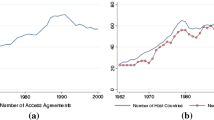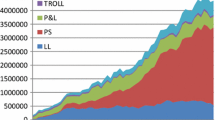Abstract
Although trade liberalization may increase a country’s welfare, its specific effect on a country’s fishing industry has not been well studied. By decomposing the effect of international trade into four parts, i.e., scale-technique effects (ST), the indirect trade-induced composition effect (IC), the indirect effect of trade intensity through income (ITC), and the direct effect of trade intensity (DTC), this study empirically investigates the effect of trade openness on country-level fisheries production. To take into account the endogeneity of trade openness and income, we adopt the instrumental variable approach. We find that a rise in trade openness reduces fisheries catch on average. In particular, the long-run effect is large. This result implies that future production is affected by current overfishing through stock dynamics. Our decomposed elasticities indicate that the ST and ITC dominate in the trade elasticity of fisheries catch. While ST implies that overfishing would be affected by trade, ITC may either establish an “overfishing haven”, similar to a “pollution haven” in the environmental literature, or production shift of fisheries to countries with lax regulation to pass stringent regulation, which is more likely to occur in high-income countries.

Similar content being viewed by others
References
Sumaila UR, Tipping A, Bellmann C (2016) Oceans, fisheries and the trade system. Mar Policy 69:171–172
Food and Agriculture Organisation (2014) The state of world fisheries and aquaculture. Food and Agriculture Organisation, Rome
Sumaila UR, Khan A, Watson R et al (2007) The World Trade Organization and global fisheries sustainability. Fish Res 88:1–3
Brander JA, Taylor MS (1997) International trade and open-access renewable resources: the small open economy case. Can J Econ 30(3):526–552
Brander JA, Taylor MS (1997) International trade between consumer and conservationist countries. Resour Energy Econ 19(4):267–297
Brander JA, Taylor MS (1998) Open access renewable resources: trade and trade policy in a two-country model. J Int Econ 44(2):181–209
Eggert H and Greaker M (2009) Effects of global fisheries on developing countries possibilities for income and threat of depletion. Working papers in economics, report 393. University of Gothenburg, Göteborg
Nielsen M (2009) Modelling fish trade liberalisation: does fish trade liberalisation result in welfare gains or losses? Mar Policy 33(1):1–7
Asche F, Bellemare MF, Roheim C, Smith MD, Tveteras S (2015) Fair enough? food security and the international trade of seafood. World Dev 67:151–160
Barro R, Lee JW (2013) A new data set of educational attainment in the world, 1950–2010. J Dev Econ 104:184–198
Managi S, Hibiki A, Tsurumi T (2009) Does trade openness improve environmental quality? J Environ Econ Manage 58(3):346–363
Tsurumi T, Managi S (2014) The effect of trade openness on deforestation: empirical analysis for 142 countries. Environ Econ Policy Stud 16(4):305–324
Antweiler W, Copeland BR, Taylor MS (2001) Is free trade good for the environment? Am Econ Rev USA 91(4):877–908
Frankel JA, Rose AK (2005) Is trade good or bad for the environment? sorting out the causality. Rev Econ Stat 87(1):85–91
Selden TM, Song D (1994) Environmental quality and development: is there a Kuznets curve for air pollution emissions? J Environ Econ Manage 27(2):147–162
Cole MA, Elliott RJR (2003) Determining the trade-environment composition effect: the role of capital, labor and environmental regulations. J Environ Econ Manage 46(3):363–383
Arellano M, Bond S (1991) Some tests of specification for panel data: Monte Carlo evidence and an application to employment equations. Rev Econ Stud 58(2):277–297
Baum CF (2006) An introduction to modern econometrics using stata. Stata, College Station
Gallet CA (2010) The income elasticity of meat: a meta-analysis. Aust J Agric Resour Econ 54(4):477–490
Pethig R (1976) Pollution, welfare, and environmental policy in the theory of comparative advantage. J Environ Econ Manage 2(3):160–169
Chichilnisky G (1994) North–South trade and the global environment. Am Econ Rev 84(4):851–874
Copeland BR, Taylor MS (1994) North–South trade and the environment. Q J Econ 109(3):755–787
Copeland BR, Taylor MS (1999) Trade, spatial separation, and the environment. J Int Econ 47(1):137–168
Worm B, Barbier EB, Beaumont N et al (2006) Impacts of biodiversity loss on ocean ecosystem services. Science 314(5800):787–790
Costello C, Ovando D, Clavelle T et al (2016) Global fishery futures under contrasting management regimes. Proc Natl Acad Sci USA 113(18):5125–5219
WTO (2017) Regional trade agreements https://www.wto.org/english/tratop_e/region_e/regfac_e.htm. Accessed 21 July 2017
Rus HA (2012) Transboundary marine resources and trading neighbours. Environ Resour Econ 53(2):159–184
Takarada Y, Dong W, Ogawa T (2013) Shared renewable resources: gains from trade and trade policy. Rev Int Econ 21(5):1032–1047
Author information
Authors and Affiliations
Corresponding author
Rights and permissions
About this article
Cite this article
Abe, K., Ishimura, G., Tsurumi, T. et al. Does trade openness reduce a domestic fisheries catch?. Fish Sci 83, 897–906 (2017). https://doi.org/10.1007/s12562-017-1130-0
Received:
Accepted:
Published:
Issue Date:
DOI: https://doi.org/10.1007/s12562-017-1130-0




